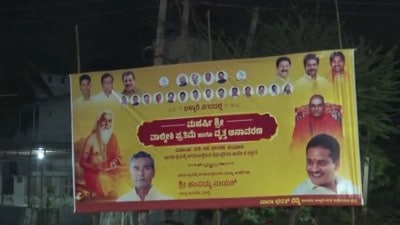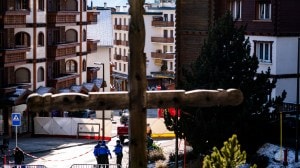Imagining a new beginning
Three words have come to define Indian politics over the last two months: Modi must go. Modi must go because he has presided over, and been ...

Three words have come to define Indian politics over the last two months: Modi must go. Modi must go because he has presided over, and been complicitous in, the worst communal conflagration this country has ever known. Modi must go because he attempts to justify that conflagration. Modi must go because when he speaks of defending the 8216;8216;five crore people of Gujarat8217;, as he does all the time, he is speaking only of one community in that state, and indeed only of one small section in that community. Modi must go because he has, through the practice of his vicious brand of politics, stood the Indian Constitution on its head. There are innumerable reasons why Narendra Modi, chief minister of Gujarat, has lost his moral and constitutional right to rule that state.
Yet, Modi has not gone. He has not gone because the Union government has chosen to play the role of Gandhi8217;s Three Monkeys: it can see no evil, hear no evil, and it will not speak. Modi, unfortunately, has become symbolic of the BJP government8217;s honour and legitimacy, therefore it raises all manner of cynical and ingenious arguments to justify his continuance in office, including the incredible claim that sacking him would invite more violence.
This is, of course, not the first time a Central government has lost its capacity to hear and to see. There are many fine accounts of how, during the 635 days of the Emergency, Indira Gandhi too had become stone deaf and totally blind. In the echo chamber of her own ambitions, she heard for the most part only the buzz of adulation created by her own propaganda machinery. It was only after losing all but two seats in the entire Hindi belt and after people came out in the streets to celebrate that defeat with the same fervour as they had when the country became independent, that she regained some of her lost faculties.
The electoral verdict of March 1977 fulfilled the prophecy that Jayaprakash Narayan had made in a letter to Indira Gandhi in July 21, 1975, from jail: 8216;8216;Please do not destroy the foundations that the Fathers of the Nation, including your father, have laid down. 8230;You have inherited a great tradition, noble values and a working democracy. Do not leave behind a miserable wreck of it all. It will take a long time to put that together again. For, it would be put together I have no doubt8230;It will rise from the grave.8217;8217;
Today, there8217;s no one to give that same message to JP8217;s former partners in resistance during the Emergency, who 8212; totally power-drunk 8212; now comprise the top echelons of the political system: Do not destroy the foundations that the Fathers of the nation have laid down. Do not institutionalise the blatant communalisation of governance because it damages the foundations on which the nation rests. The Centre is now busy choreographing an elaborate charade. Where it is expected to correct the deep flaws and ugly distortions in a system, it has come up with a few band-aids. Where it is expected to punish in an exemplary manner the perpetrators of heinous offences, it comes up with pails of fresh whitewash. Today, the nation is supposed to be grateful that some FIRs in Gujarat have actually being filed at long last after most of the evidence had been destroyed; that some few hundreds of rupees are being disbursed to compensate for damage of mind, body and material goods that cannot be even estimated by normal yardsticks; that some caches of swords and petrol bombs being unearthed and confiscated, when they have already achieved their deadly purpose.
As camps are slated to be soon dismantled and people forced back to neighbourhoods that were once ablaze, we may soon see Gujarat being officially declared a zone of peace and harmony. Thus will the sweet smell of incense float over the ruins, even as mutual hatreds and suspicions smoulder within. And there, in one corner, will be K.P.S. Gill, furiously twirling his mustache. But even Gill knows the limitations of Gillism. As he recently explained,8216;8216;The police cannot bring peace, it can only stop incidents.8217;8217;
|
Modi has not gone because the Union government has chosen to play the role of Gandhi8217;s Three Monkeys: it can see no evil, hear no evil, and it will not speak
|
For peace in Gujarat you need systemic reform, involving not just the state but civil society, not just politicians but citizens. It needs what Bhikhu Parekh, a son of Gujarat and professor of political theory, London School of Economics, envisaged in a recent article in Seminar, as the building of a national identity, 8216;8216;so defined that all Indians, irrespective of their cultural, ethnic, religious and other differences, can enthusiastically identify with it8230;an overarching vision, not of Hindutva but of Bharatiyata, one that affirms and cherishes our rich cultural and religious diversity and embeds it in those public values, sensibilities and institutions that we all do or should share in common8217;8217;. But, as Parekh takes care to caution, this great political project requires a 8216;8216;historically sensitive imagination, a culturally attuned intelligence, and a shrewd sense of political possibilities8217;8217;. Do we have it in us? Going by the responses of the past, it would seem that we do.
Like the Emergency had done over two and half decades ago, Gujarat sounds the siren on a republic in danger. The Emergency persuaded ordinary citizens, caught up in their private lives, to confront a public threat. It forced them to resist and conjure up new ways to counter and undermine a dictatorial, discriminatory and illegitimate political order. Gujarat will now force us to introspect on the deep schisms that divide us as a people and on the political forces at work in promoting hate agendas seeking to widen those very fissures. We will, privately and publicly, politically and culturally, search for ways to put an end to this dangerous process. We will seek the tools to rebuild those broken bridges in a ravaged landscape.
This is a project to reclaim Indian nationhood. Now 8216;Indian nationhood8217; is a loaded concept, and many have tried to define it according to their own ideological persuasion. But the definition that should concern us here is the only one that has the consensus of the Indian people and it is the vision encapsulated in a famous preamble: 8216;8216;We, the People of India, have solemnly resolved to constitute India into a sovereign, socialist, secular democratic republic and to secure to all its citizens: Justice, social, economic and political; Liberty of thought, expression, belief, faith and worship; Equality of status and opportunity; and to promote among them all Fraternity assuring the dignity of the individual and the unity and integrity of the Nation8217;8217;.
So many reasons why Modi needs to pack his bags.
- 01
- 02
- 03
- 04
- 05































